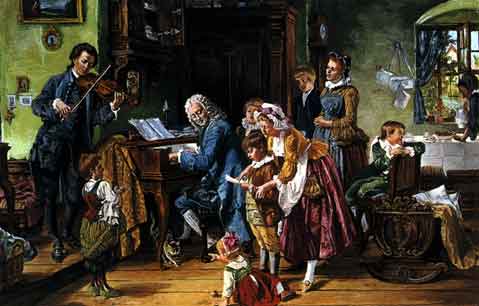
A 19th century depiction of the Bach family at morning practice.
Bach was born in Eisenach, Germany, on March 21, 1685. He was the youngest of the eight children of Johann Ambrosius Bach and his wife, Maria Elisabeth Lammerhirt. Eisenach's director of town music, Johann Ambrosius had also served as leader of the town band in Arnstadt and as a violinist in Erfurt. Johann Sebastian attended the Eisenach Latin school as a child. In 1694 his mother died, and his father followed less than a year later(Bach).
Orphaned a month before his tenth birthday, he went to live with his oldest brother, Johann Christoph, who was the organist at Ohrdruf. He received musical instruction from his brother. His formal education continued at the school there until he was almost fifteen. In 1700 he obtained a paid position in the choir of St. Michael at Lüneburg. Although his voice broke the next year, Bach was kept on, presumably because of his ability as an instrumentalist. While at Lüneburg, Bach frequently traveled many miles on foot to Hamburg to hear famous organist Johann Adam Reinken (1623-1722), and to Celle to hear a French orchestra. Reportedly, Bach was also influenced by Georg Böhm (1661-1733), celebrated organist in Lüneburg(Bach).
Bach left Lüneburg in 1702 to seek a more permanent position. For six months he served as a violinist in the court orchestra of the younger brother of the Duke of Weimar, and was then offered, at the age of eighteen, the position of organist and choirmaster at St. Boniface in Arnstadt after testing the organ there. In 1705 Bach took a month's leave from St. Boniface to study under organist Dietrich Buxtehude at Lubeck. Bach ended up staying four months. Upon his return there was considerable bitterness over the lengthy, unauthorized absence. The church council also objected to Bach's organ playing, considering it to be too flamboyant. What had begun as a harmonious arrangement had become anything but, and in 1707 he accepted a new post—organist at St. Blasius in Mühlhausen(Bach).
Within a year, however, Bach had requested release from this position because his religious views differed from those of his new employer. The superintendent sought to drastically reduce concerted music in favor of congregational singing. Bach naturally sided with the more traditional Lutherans, who aimed at maintaining traditional and modern concerted music(Bach).

Bach in his younger years.